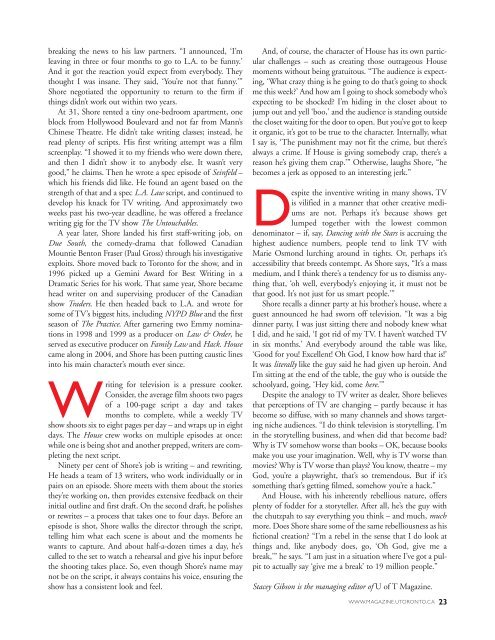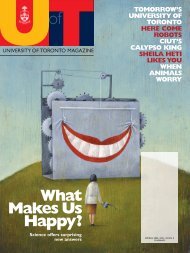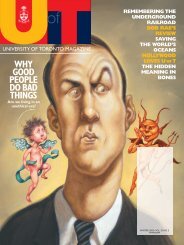THE HOUSE THAT DAVE BUILT - University of Toronto Magazine
THE HOUSE THAT DAVE BUILT - University of Toronto Magazine
THE HOUSE THAT DAVE BUILT - University of Toronto Magazine
Create successful ePaper yourself
Turn your PDF publications into a flip-book with our unique Google optimized e-Paper software.
eaking the news to his law partners. “I announced, ‘I’m<br />
leaving in three or four months to go to L.A. to be funny.’<br />
And it got the reaction you’d expect from everybody. They<br />
thought I was insane. They said, ‘You’re not that funny.’”<br />
Shore negotiated the opportunity to return to the firm if<br />
things didn’t work out within two years.<br />
At 31, Shore rented a tiny one-bedroom apartment, one<br />
block from Hollywood Boulevard and not far from Mann’s<br />
Chinese Theatre. He didn’t take writing classes; instead, he<br />
read plenty <strong>of</strong> scripts. His first writing attempt was a film<br />
screenplay. “I showed it to my friends who were down there,<br />
and then I didn’t show it to anybody else. It wasn’t very<br />
good,” he claims. Then he wrote a spec episode <strong>of</strong> Seinfeld –<br />
which his friends did like. He found an agent based on the<br />
strength <strong>of</strong> that and a spec L.A. Law script, and continued to<br />
develop his knack for TV writing. And approximately two<br />
weeks past his two-year deadline, he was <strong>of</strong>fered a freelance<br />
writing gig for the TV show The Untouchables.<br />
A year later, Shore landed his first staff-writing job, on<br />
Due South, the comedy-drama that followed Canadian<br />
Mountie Benton Fraser (Paul Gross) through his investigative<br />
exploits. Shore moved back to <strong>Toronto</strong> for the show, and in<br />
1996 picked up a Gemini Award for Best Writing in a<br />
Dramatic Series for his work. That same year, Shore became<br />
head writer on and supervising producer <strong>of</strong> the Canadian<br />
show Traders. He then headed back to L.A. and wrote for<br />
some <strong>of</strong> TV’s biggest hits, including NYPD Blue and the first<br />
season <strong>of</strong> The Practice. After garnering two Emmy nominations<br />
in 1998 and 1999 as a producer on Law & Order, he<br />
served as executive producer on Family Law and Hack. House<br />
came along in 2004, and Shore has been putting caustic lines<br />
into his main character’s mouth ever since.<br />
Writing for television is a pressure cooker.<br />
Consider, the average film shoots two pages<br />
<strong>of</strong> a 100-page script a day and takes<br />
months to complete, while a weekly TV<br />
show shoots six to eight pages per day – and wraps up in eight<br />
days. The House crew works on multiple episodes at once:<br />
while one is being shot and another prepped, writers are completing<br />
the next script.<br />
Ninety per cent <strong>of</strong> Shore’s job is writing – and rewriting.<br />
He heads a team <strong>of</strong> 13 writers, who work individually or in<br />
pairs on an episode. Shore meets with them about the stories<br />
they’re working on, then provides extensive feedback on their<br />
initial outline and first draft. On the second draft, he polishes<br />
or rewrites – a process that takes one to four days. Before an<br />
episode is shot, Shore walks the director through the script,<br />
telling him what each scene is about and the moments he<br />
wants to capture. And about half-a-dozen times a day, he’s<br />
called to the set to watch a rehearsal and give his input before<br />
the shooting takes place. So, even though Shore’s name may<br />
not be on the script, it always contains his voice, ensuring the<br />
show has a consistent look and feel.<br />
And, <strong>of</strong> course, the character <strong>of</strong> House has its own particular<br />
challenges – such as creating those outrageous House<br />
moments without being gratuitous. “The audience is expecting,<br />
‘What crazy thing is he going to do that’s going to shock<br />
me this week?’ And how am I going to shock somebody who’s<br />
expecting to be shocked? I’m hiding in the closet about to<br />
jump out and yell ‘boo,’ and the audience is standing outside<br />
the closet waiting for the door to open. But you’ve got to keep<br />
it organic, it’s got to be true to the character. Internally, what<br />
I say is, ‘The punishment may not fit the crime, but there’s<br />
always a crime. If House is giving somebody crap, there’s a<br />
reason he’s giving them crap.’” Otherwise, laughs Shore, “he<br />
becomes a jerk as opposed to an interesting jerk.”<br />
Despite the inventive writing in many shows, TV<br />
is vilified in a manner that other creative mediums<br />
are not. Perhaps it’s because shows get<br />
lumped together with the lowest common<br />
denominator – if, say, Dancing with the Stars is accruing the<br />
highest audience numbers, people tend to link TV with<br />
Marie Osmond lurching around in tights. Or, perhaps it’s<br />
accessibility that breeds contempt. As Shore says, “It’s a mass<br />
medium, and I think there’s a tendency for us to dismiss anything<br />
that, ‘oh well, everybody’s enjoying it, it must not be<br />
that good. It’s not just for us smart people.’”<br />
Shore recalls a dinner party at his brother’s house, where a<br />
guest announced he had sworn <strong>of</strong>f television. “It was a big<br />
dinner party, I was just sitting there and nobody knew what<br />
I did, and he said, ‘I got rid <strong>of</strong> my TV. I haven’t watched TV<br />
in six months.’ And everybody around the table was like,<br />
‘Good for you! Excellent! Oh God, I know how hard that is!’<br />
It was literally like the guy said he had given up heroin. And<br />
I’m sitting at the end <strong>of</strong> the table, the guy who is outside the<br />
schoolyard, going, ‘Hey kid, come here.’”<br />
Despite the analogy to TV writer as dealer, Shore believes<br />
that perceptions <strong>of</strong> TV are changing – partly because it has<br />
become so diffuse, with so many channels and shows targeting<br />
niche audiences. “I do think television is storytelling. I’m<br />
in the storytelling business, and when did that become bad?<br />
Why is TV somehow worse than books – OK, because books<br />
make you use your imagination. Well, why is TV worse than<br />
movies? Why is TV worse than plays? You know, theatre – my<br />
God, you’re a playwright, that’s so tremendous. But if it’s<br />
something that’s getting filmed, somehow you’re a hack.”<br />
And House, with his inherently rebellious nature, <strong>of</strong>fers<br />
plenty <strong>of</strong> fodder for a storyteller. After all, he’s the guy with<br />
the chutzpah to say everything you think – and much, much<br />
more. Does Shore share some <strong>of</strong> the same rebelliousness as his<br />
fictional creation? “I’m a rebel in the sense that I do look at<br />
things and, like anybody does, go, ‘Oh God, give me a<br />
break,’” he says. “I am just in a situation where I’ve got a pulpit<br />
to actually say ‘give me a break’ to 19 million people.”<br />
Stacey Gibson is the managing editor <strong>of</strong> U <strong>of</strong> T <strong>Magazine</strong>.<br />
WWW.MAGAZINE.UTORONTO.CA 23

















